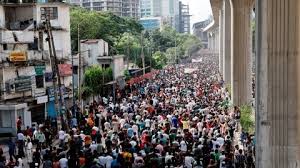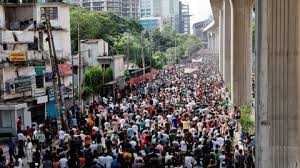
In recent months, a significant number of Hindus from Bangladesh have sought refuge in India amid ongoing turmoil and violence in their home country. The situation has highlighted the complex and often precarious position of religious minorities in Bangladesh, as well as the challenges and responses faced by neighboring India. Here’s an in-depth look at the situation, its causes, and the implications for both Bangladesh and India.
Table of Contents
Context of the Crisis
Background: Bangladesh, a predominantly Muslim country, has faced various socio-political challenges, including religious tensions and violence against minorities. Hindus, who constitute a small but significant minority in Bangladesh, have been particularly affected by these tensions.
Recent Developments: The recent surge in violence against Hindus in Bangladesh has been fueled by a combination of factors, including:
- Political Instability: Political unrest and instability have exacerbated communal tensions, leading to sporadic violence against religious minorities.
- Religious Extremism: The rise of extremist elements and radical groups has contributed to attacks on Hindu communities, targeting their homes, temples, and places of worship.
- Economic and Social Challenges: Economic hardships and social grievances have sometimes been expressed through violence against minority communities, with religious tensions being used as a scapegoat.
Specific Incidents: The situation has been marked by several high-profile incidents of violence against Hindus, including attacks on temples, vandalism, and physical assaults. These incidents have driven many Hindus to seek safety and refuge in neighboring India.
Refugee Crisis: Hindus Seeking Safety
Migration Trends: The increasing violence and insecurity have led to a growing number of Hindus crossing into India in search of safety. Many have traveled through informal routes, often facing difficult and perilous journeys.
Key Routes and Destinations:
- Border Areas: The majority of refugees have entered India through the border regions of West Bengal and Assam, which share a long and porous border with Bangladesh.
- Refugee Camps and Shelters: Upon entering India, refugees have sought temporary shelter in refugee camps and local communities. Some have managed to stay with relatives or acquaintances already living in India.
Challenges Faced by Refugees:
- Legal and Administrative Hurdles: Refugees often face legal and bureaucratic challenges in obtaining refugee status and accessing assistance. The process for asylum and refugee status in India can be complex and slow.
- Living Conditions: Many refugees live in difficult conditions, with limited access to basic necessities such as food, clean water, and healthcare.
- Security Concerns: Refugees are vulnerable to exploitation and abuse, both during their journey and after arriving in India.
India’s Response to the Refugee Influx
Government Actions:
- Border Security: The Indian government has strengthened border security to manage the influx of refugees and prevent illegal migration. Measures have been taken to control and monitor the flow of individuals crossing the border.
- Humanitarian Assistance: Indian authorities and non-governmental organizations (NGOs) have provided humanitarian assistance to refugees, including food, shelter, and medical care. Efforts are being made to address the immediate needs of the displaced individuals.
Political and Social Reactions:
- Political Debate: The influx of refugees has sparked political debate in India. Some political leaders and parties have called for more robust measures to manage the situation, while others advocate for compassionate responses and support for the refugees.
- Public Sentiment: Public reactions in India have been mixed. While there is considerable sympathy and support for the refugees among certain sections of the population, there are also concerns about the impact on local resources and security.
Legal and Policy Considerations:
- Citizenship Amendment Act (CAA): The Citizenship Amendment Act, passed by the Indian government in 2019, provides a pathway to Indian citizenship for non-Muslim refugees from neighboring countries, including Hindus from Bangladesh. The Act has been controversial and has faced criticism from various quarters, including concerns about its implications for secularism and minority rights.
- Asylum Policies: India does not have a formal asylum policy, which complicates the process for refugees seeking official recognition and legal status.
Implications and Consequences
Impact on Bangladesh:
- International Criticism: The violence and persecution of Hindus have attracted international criticism and scrutiny of Bangladesh’s human rights record. The situation has raised concerns about the protection of religious minorities and the role of the government in addressing communal tensions.
- Domestic Response: The Bangladeshi government has faced pressure to address the root causes of the violence and to ensure the protection of minority communities. Efforts are being made to improve security and investigate incidents of violence.
Impact on India:
- Humanitarian Responsibility: India’s response to the refugee crisis is an important aspect of its humanitarian and diplomatic policies. The treatment of refugees reflects the country’s approach to international obligations and human rights.
- Political and Social Dynamics: The refugee influx has implications for domestic politics and social cohesion in India. Managing the refugee situation requires balancing humanitarian concerns with national security and resource management.
Long-Term Solutions:
- Addressing Root Causes: Long-term solutions require addressing the underlying causes of violence and instability in Bangladesh. Efforts to promote interfaith dialogue, enhance security, and address socio-economic grievances are crucial in reducing communal tensions.
- Regional Cooperation: Regional cooperation between Bangladesh and its neighbors, including India, is essential for managing migration and addressing the challenges faced by refugees. Collaborative approaches can help improve security, support refugees, and foster regional stability.
Conclusion: A Complex Humanitarian Challenge
The situation of Hindus seeking refuge in India amid turmoil in Bangladesh is a multifaceted humanitarian crisis that highlights the intersection of religious persecution, migration, and international responses. The ongoing violence against minorities in Bangladesh and the subsequent refugee influx into India underscore the urgent need for effective measures to address both immediate and long-term challenges.
As India navigates the complexities of managing the refugee crisis, it must balance humanitarian responsibilities with practical considerations. Regional cooperation and efforts to address the root causes of violence are critical for ensuring the safety and well-being of affected individuals and fostering stability in the region.








